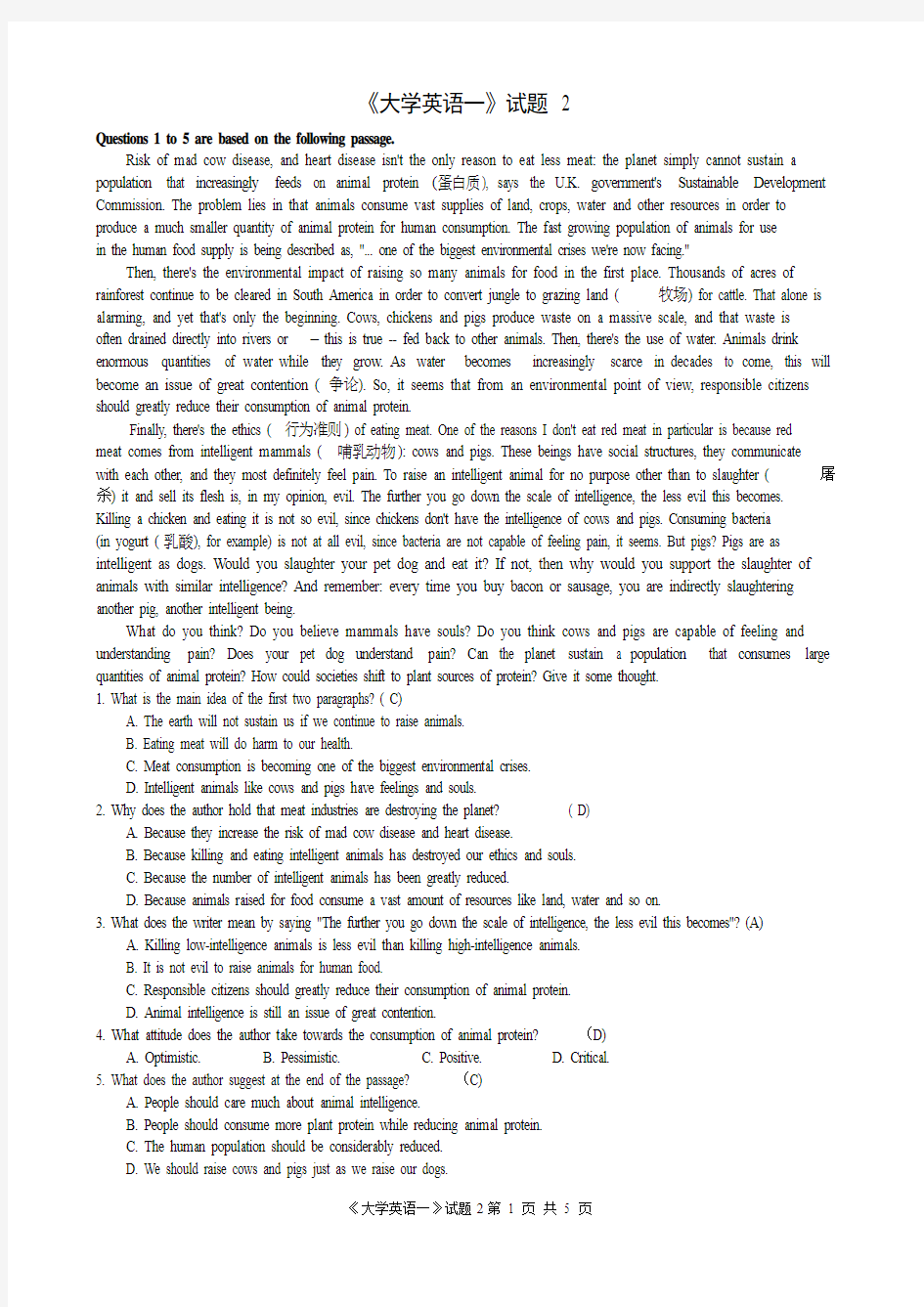
《大学英语一》试题2答案
- 格式:doc
- 大小:62.50 KB
- 文档页数:5


《大学英语一》试题2
Questions 1 to 5 are based on the following passage.
Risk of mad cow disease, and heart disease isn't the only reason to eat less meat: the planet simply cannot sustain a population that increasingly feeds on animal protein (蛋白质), says the U.K. government's Sustainable Development Commission. The problem lies in that animals consume vast supplies of land, crops, water and other resources in order to produce a much smaller quantity of animal protein for human consumption. The fast growing population of animals for use in the human food supply is being described as, "... one of the biggest environmental crises we're now facing."
Then, there's the environmental impact of raising so many animals for food in the first place. Thousands of acres of rainforest continue to be cleared in South America in order to convert jungle to grazing land (牧场) for cattle. That alone is alarming, and yet that's only the beginning. Cows, chickens and pigs produce waste on a massive scale, and that waste is often drained directly into rivers or – this is true -- fed back to other animals. Then, there's the use of water. Animals drink enormous quantities of water while they grow. As water becomes increasingly scarce in decades to come, this will become an issue of great contention (争论). So, it seems that from an environmental point of view, responsible citizens should greatly reduce their consumption of animal protein.
Finally, there's the ethics (行为准则) of eating meat. One of the reasons I don't eat red meat in particular is because red meat comes from intelligent mammals (哺乳动物): cows and pigs. These beings have social structures, they communicate with each other, and they most definitely feel pain. To raise an intelligent animal for no purpose other than to slaughter (屠杀) it and sell its flesh is, in my opinion, evil. The further you go down the scale of intelligence, the less evil this becomes. Killing a chicken and eating it is not so evil, since chickens don't have the intelligence of cows and pigs. Consuming bacteria (in yogurt (乳酸), for example) is not at all evil, since bacteria are not capable of feeling pain, it seems. But pigs? Pigs are as intelligent as dogs. Would you slaughter your pet dog and eat it? If not, then why would you support the slaughter of animals with similar intelligence? And remember: every time you buy bacon or sausage, you are indirectly slaughtering another pig, another intelligent being.
What do you think? Do you believe mammals have souls? Do you think cows and pigs are capable of feeling and understanding pain? Does your pet dog understand pain? Can the planet sustain a population that consumes large quantities of animal protein? How could societies shift to plant sources of protein? Give it some thought.
1. What is the main idea of the first two paragraphs? ( C)
A. The earth will not sustain us if we continue to raise animals.
B. Eating meat will do harm to our health.
C. Meat consumption is becoming one of the biggest environmental crises.
D. Intelligent animals like cows and pigs have feelings and souls.
2. Why does the author hold that meat industries are destroying the planet? ( D)
A. Because they increase the risk of mad cow disease and heart disease.
B. Because killing and eating intelligent animals has destroyed our ethics and souls.
C. Because the number of intelligent animals has been greatly reduced.
D. Because animals raised for food consume a vast amount of resources like land, water and so on.
3. What does the writer mean by saying "The further you go down the scale of intelligence, the less evil this becomes"? (A)
A. Killing low-intelligence animals is less evil than killing high-intelligence animals.
B. It is not evil to raise animals for human food.
C. Responsible citizens should greatly reduce their consumption of animal protein.
D. Animal intelligence is still an issue of great contention.
4. What attitude does the author take towards the consumption of animal protein?(D)
A. Optimistic.
B. Pessimistic.
C. Positive.
D. Critical.
5. What does the author suggest at the end of the passage? (C)
A. People should care much about animal intelligence.
B. People should consume more plant protein while reducing animal protein.
C. The human population should be considerably reduced.
D. We should raise cows and pigs just as we raise our dogs.